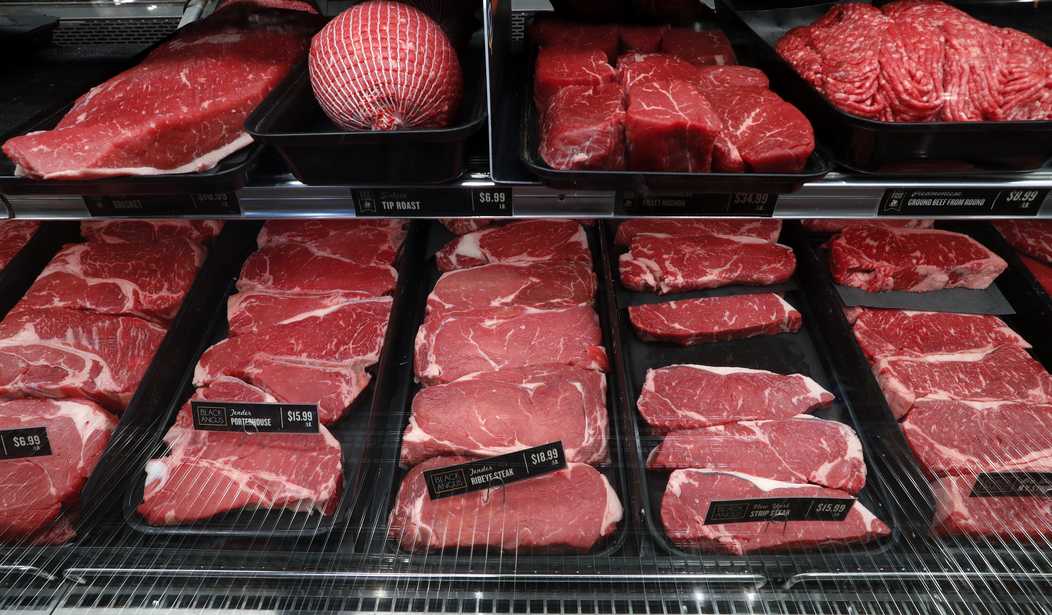True story: Alaska just opened the application process for big game draw permit hunts in 2025. I always enroll my wife and me in the November and December antlerless moose drawing because, by that time of year, we often have them literally hanging around the yard. While we didn't draw for this year, we have had a big cow and her yearling calf hanging around, and I confess I was casting a contemplative gaze or two their way.
And, oddly, just after watching them on the edge of our yard eating our lilac bushes last night - and if they wanted to give me even more motivation to put them in the freezer, devouring our landscaping would be one way to go about it - I read this morning that the ongoing UN COP29 climate conference is once more being harangued by a group wanting a punitive sin tax on meat.
So, will they tax my moose? Well, no. But beef, pork, and so on? Domestic meat is in their sights (the play on words, yes, is intentional.)
The True Animal Protein Price (TAPP) Coalition gave comments at the 2024 U.N. Climate Change (COP29) Conference Monday urging countries to begin taxing meat.
The U.N. Food and Agriculture Organization (FAO) issued a report Friday weighing the pros and cons of a tax on certain foods, including meat. TAPP Coalition raised the topic at COP29 this week, suggesting that countries should tax meat and subsidize vegetables while describing the U.S. and some Western nations as a “laggard” relative to other U.N. countries when it comes to its food pricing policies.
It would be much more accurate, of course, to note that "some Western nations," by which they of course mean the United States, are not "laggards" in any such thing - we are freer than those other nations, free to eat what we please. It's a safe bet that the incoming Congress and the resurgent Trump administration will give any short shrift to any sin-tax-on-meat proposals, and that's a good thing.
There are a few American politicians who are down with such a scheme but for the next four years at least, it's not going anywhere.
Here's what the TAPP Coalition's spokesdroid had to say:
“We believe that COP29 and UNFCCC [United Nations Framework Convention on Climate Change] conferences thereafter can only be successful if the closing statement includes transitioning away from animal protein overconsumption according to national or global dietary guidelines by implementing greenhouse gas emission pricing mechanisms in agri-food systems,” Willem Branten, public affairs and policy officer at TAPP, said at the conference this week. “We urge the EU Commission, the OECD and China to lead the way towards these harmonized pricing mechanisms.”
I have a short answer for Mr. Branten:
No.
I have a longer answer, of course, as well. The TAPP Coalition isn't happy just to advocate for punitive "sin taxes" on meat. They also want vegetables subsidized - in other words, they want the heavy hand of government to place a thumb on the scale of the grocery marketplace, as though the current round of Bidenflation had not done enough damage already.
They are worried about greenhouse gas emissions, they say. I'd ask this: What produces more CO2? A cow grazing on the Great Plains that might produce 500 pounds of beef, or raising 500 pounds of rice, potatoes, or corn? I'm pretty sure I know the answer to that.
See Related: What Will Trump II's Energy Policies Look Like? Less Green, More Lean and Mean
PETA to Kick Off National Tour to Harass People Into Avoiding Turkey on Thanksgiving
Coming Soon to a Grocer Near You? Britons Urged to Reduce Meat Consumption by 50 Percent
The thing is that humans are, by our very nature, omnivores. We are naturally inclined to eat a wide range of foods; the human digestive system is a very middle-of-the-road affair as mammals go, lacking the short gut of obligate carnivores like cats but also lacking the big, fermentation-chamber stomachs of grazing ruminants or the hard, continually-growing, silica-resistant teeth of grazing animals like horses. The human digestive system is basically a garbage disposal. We can turn almost anything into nutrition. Our ability to take advantage of a huge variety of foods is what has enabled humans to spread across the planet, from the Arctic to Tierra del Fuego, from the Sahara to Siberia to the Amazon.
But we can't digest woody plants or grass. Grazing animals can - and they can turn those materials, that are inedible to us, into edible protein. What's more, we can graze a lot of these critters on land that is, at best, marginal for monoculture row-crop farming or truck farming.
And if it's animal emissions they are worried about, as in the tired old "methane from cow flatulence" claim, I'd like to see them compare some numbers from today's North American cattle herds and the 65 million bison that were roaming the Great Plains in 1700, which I would remind them was pre-Industrial Revolution.
The TAPP Coalition is pursuing an agenda, and it's not about climate change. It's about control. It's about forcing behavior that they want to be enforced. It's always about control with these people, and once you realize this, everything else they say and do starts to make sense. But, to our good fortune, for the next few years, we Americans don't have to worry too much about them.














